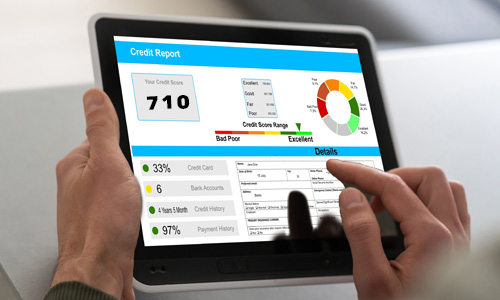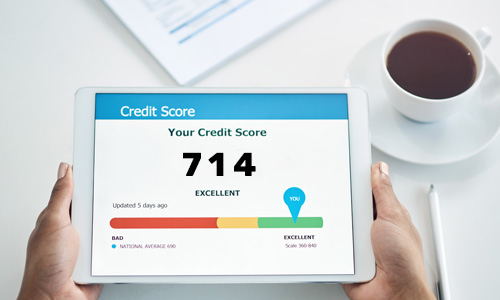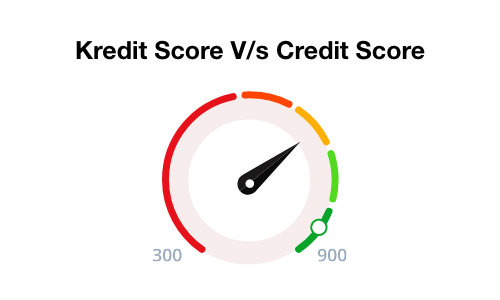What Does a 648 Credit Score Mean?
In the UAE, credit scores range between 300 and 900. The following table gives a general overview of different credit score categories -
| Credit Score Range | Rating |
|---|---|
| 300 to 619 | Poor |
| 620 to 679 | Fair |
| 680 to 730 | Good |
| 731 to 900 | Excellent |
As we can see from the table, a 648 credit score is usually considered to be a fair credit score. While this credit score is better than a poor credit score, you still remain under the radar of banks and lending institutions for lack of creditworthiness. Some banks and lending institutions in the UAE see a 648 credit score as an unfavourable score and may decline your credit facility application.
However, some lenders specialise in subprime lending, although they might offer credit facilities to you at higher interest rates and larger fees. Thus, to get credit easily at favourable rates, it’s important to ramp up your credit Score UAE. For this, you can repay your credit card debts on time, have a strong stream of income, and follow a few more steps that we will cover in a later section.
Credit Card Options Available with a 648 Credit Score
If you have a fair credit score, you'll find several unsecured credit card options available to you. These cards differ from secured ones as they don’t necessitate a security deposit.
Having a 648 credit score means you could potentially be granted a credit card with a somewhat modest credit limit. However, some card issuers may automatically assess your credit limit, possibly increasing it, following several months of punctual payments. Your credit limit holds significance because it is directly tied to your credit utilisation rate.
Securing approval for a cashback or travel rewards credit card can be challenging if you possess fair credit. While you might come across a card that offers limited cashback benefits on purchases, the most lucrative credit cards typically mandate a good or excellent credit history.
Personal Loan for a Person with a 648 Credit Score
While your 648 credit score may enable you to be eligible for a personal loan, it's important to note that you might face a higher interest rate and additional fees compared to those with good or excellent credit scores.
These elevated interest rates and added fees could potentially diminish the attractiveness of the loan, depending on your specific financial needs. For instance, if your goal is to consolidate credit card debt using a personal loan, the interest rate on the new loan might not be sufficiently low to generate long-term savings, especially when factoring in the upfront fees.
Conversely, if you intend to use a personal loan for a significant purchase, it's worth considering whether this purchase is an immediate necessity or something that can be postponed. By waiting and dedicating time to improving your credit score, you may enhance your chances of qualifying for a loan with a more favourable interest rate.
Auto Loan for an Individual with a 648 Credit Score
While there is no specific credit score mandate to apply for an auto loan, banks and other lending institutions still require you to have a good credit score.
Having a 648 credit score can limit your loan options. Even if your loan gets approved, the bank may charge higher interest rates and heavy fees. For this reason, you can also switch to some alternative approaches for getting auto loans -
- Paying a Larger Portion of the Car’s Value as a Down Payment - When you pay a larger portion of the vehicle’s value as down payment, you would need to apply for a smaller auto loan. This will reduce the total interest amount of the loan.
- Apply with a Co-Signer - When you apply for an auto loan with a co-signer with a good credit score, your chances of getting the auto loan approved increase. However, make sure that the co-signer is a trustworthy friend or family member who can be relied upon when required.
- Look for Other Options - If you find that an auto loan from a dealership or bank will not work for you owing to your 648 credit score, you can also apply for the loan from an online lender or a credit union.
Home Loan for a Person with a 648 Credit Score
You can get only a few home loan options with your 648 credit score — in most cases, you will be able to opt for loans under government housing schemes. To get traditional home loans, you might need to pay a larger amount of the property’s value as a down payment to lower the interest rate on the home loan.
How to Improve Your 648 Credit Score?
While it is not possible to improve your 648 credit score overnight, consistent and disciplined changes in your financial habits can certainly help you achieve your goal.
To improve your 648 credit score, practise the following strategies -
-
Apply for a Secured Credit Card -
A secured credit card enables you to build your credit score. Once the lender or the bank approves your credit card application, you will need to provide a deposit of the amount equal to your credit limit.
When it comes to building your 648 credit score, you would need to make timely credit card bill payments and keep the credit card usage below 30% of the total limit.
-
Consider Opting for a Credit-Builder Loan -
Just as the name suggests, these loans are specifically crafted to assist in establishing or strengthening borrowers' credit histories, proving their capability to consistently meet monthly payment obligations. When you decide to acquire one of these loans, the credit union deposits the borrowed sum into a savings account that accumulates interest over time.
After successfully repaying the loan, you not only receive the borrowed amount but also the interest it has generated. It serves as a clever savings instrument, yet the true benefit emerges when the credit union reports your payment history to the national credit bureaus, potentially resulting in enhancements to your credit score.
Before applying for a credit-builder loan, it's advisable to verify with the lender whether they report your financial activity to al etihad credit bureau (AECB).
-
Consider Opting for a Debt Management Plan -
A debt management plan (DMP) can offer assistance to borrowers who discover themselves in a situation where they've stretched their finances thin and are struggling to meet their credit obligations. By collaborating with a certified credit counselling organisation, you can work out a more manageable repayment plan that involves closing all your credit accounts.
Although this step may temporarily have a negative impact on your credit score, it's a less severe option than declaring bankruptcy and can eventually provide you with a fresh start for rebuilding your credit.
Even if you don't opt for a DMP, a reputable non-profit credit counsellor (distinguished from credit repair firms) can guide you in developing strategies to improve your creditworthiness.
-
Pay Your Bills on Time -
To enhance your credit score effectively, there's nothing more beneficial than addressing overdue accounts and ensuring that you steer clear of late payments in the future.
You can employ various strategies to help you stay on top of your bill payments, such as setting up automatic payments, scheduling calendar alerts, or leaving notes in visible places as reminders. Over the course of a few months, you'll establish routines that foster improved credit scores, all by diligently adhering to these practices.
-
Maintain Low Credit Utilisation Ratio -
Maintaining a utilisation rate of around 30% or lower can assist in preventing a decrease in your credit score. It's advisable to build a diverse credit portfolio to enhance your financial profile. While it's essential not to accrue unnecessary debt, responsible borrowing that includes both revolving and instalment credit can positively impact your credit score.
| Credit Score for different types of Loan | |||
|---|---|---|---|
| Credit Score for Personal Loan | Credit Score for House Loan | Credit Score for Car Loan | Credit Score for Student Loan |
Frequently Asked Questions
Ans: The factors include your payment history, total debt and credit, length of credit history, and frequency of loan applications.
Ans: The path to improving your 648 credit score from ‘okay’ to ‘great’ varies for each person as per their credit history. However, some general good habits for managing your credit can be of help here such as repaying bills and debts on time, having a good mix of credit, maintaining a low credit utilisation ratio, and so forth.
Ans: Having a credit score of 648 might make it tough to qualify for a cashback or travel rewards credit card. While you might find a card that gives you a bit of cashback, the best rewards cards will usually require you to have really good credit score.

More From Credit Score
- Recent Articles
- Popular Articles












